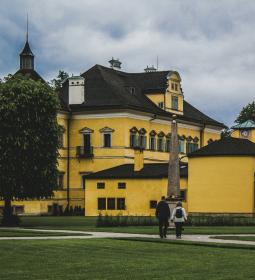Drama and dramatic art are forms of storytelling played out on stage in front of an audience. These stories and how they are portrayed come in a wide variety of styles/genres. A future degree in drama and dramatic arts opens up many career opportunities, as both fields offer a wide variety of roles. Combining creative talent with the practical aspects of self-promotion, these destinations will be the perfect choice for those who want to unleash their innate talents in a variety of performing arts. In the process of studying , you can specialize and increase the level of competence in a variety of areas: from the work of an ordinary employee of a theater or cinema to the development of dramaturgical abilities as a scriptwriter or director.
Educational directions in this area belong to the "Person – Artistic Image" type and are focused on work related to the creation of new artistic images in the world of art. Therefore, as a transformative and creative class of professions, it is associated with creative activity, the creation of new images, and reincarnation. In terms of working conditions, the type of profession refers to work carried out indoors in a microclimate and outdoors, that is, it is usually a fairly mobile format.
Training in specializations related to drama and dramatic art helps students to become professionals in all respects: drama allows and makes a focus on the person himself and on his best character traits as an end in itself. To become a professional in the field of art, first of all, you need to work on yourself for many hours, to learn and understand all the facets of your personality. Many applicants, planning to study at drama faculties, do not realize that the main action of drama takes place not on stage, but in the process of individual work.
Pros of the specialty
- Maximum disclosure of creative skills, development of talents and acquisition of new competencies. Almost all professions in the field of drama and dramatic art give specialists the opportunity to express their creative potential and do what they love as an income-generating job.
- The benefits of theatre education extend beyond theatre walls and film sets. Psychological research shows that drama students tend to have higher academic achievement and cognitive abilities: by actively participating in dramatic performances, they improve their critical thinking skills by analyzing scenarios, interpreting characters, and making artistic choices.
- By studying drama, people develop a deeper understanding of human emotions, the dynamics of society, and the complexities of relationships. Heightened emotional intelligence not only enriches personal experiences, but also strengthens interpersonal connections and empathy in everyday life.
- A manifold increase in acquaintances, friends, colleagues and connections in the art industry and beyond. Creative professions are often intertwined in real life, creating seasonal collaborations or long-term projects. Therefore, specialists involved in the industry acquire a large list of useful contacts.
Directions and options for professions in the specialty "Drama and Dramatic Arts"
Contrary to the stereotypical belief that creative fields don't have much career choice and are not professionally satisfying, there are many fields that a student can explore if they want to be part of the creative field. The following are some career options that a student can explore in the field of art and drama:
- Drama theater and film actor (actor) is one of the most revered professions in the field of performing arts. The actor plays the role of a character created by the imagination of the screenwriter at the direction of the director. Those with a knack for acting can develop their skills by enrolling in the best acting colleges in the world, known for producing legendary actors to the world. Prestigious acting schools carefully select enthusiastic candidates for a limited number of seats to ensure that each candidate is given special attention to improve their skills. Acting is a very competitive profession that combines art and drama.
- Costume Manager, Costume Designer – This specialist is responsible for ensuring that each actor or actor is provided with the costumes necessary for a particular role and additionally has a spare wardrobe in case of unforeseen circumstances. The director is able to perform the same functions as an ordinary costume designer: to properly store costumes and repair them, to adjust clothes to size, to help the actor change clothes faster.
- Make-up artists – representatives of this profession must have a subtle artistic flair and aesthetic taste, often have the skills of a hairdresser and make-up artist. Most often, make-up artists independently think over the image of the actors in order to do it in the best possible way, so specialists must understand the director's idea, know how the lighting is exposed, how the character will move around the stage or in the frame. Experienced make-up artists often additionally teach make-up courses and earn money on it outside of their main job.
- An illuminator and lighting designer is a specialist who creates and implements lighting effects that accompany a play or a scene in a film, he monitors the smooth operation of equipment and promptly responds to unforeseen situations.
- Dancer or choreographer – a career in dance is for strong-willed and enthusiastic people who are not deterred by social stereotypes. Under the guidance of a choreographer, students undergo thorough training, while the coursework includes an in-depth study of the philosophy and ideas associated with various forms of dance: ballet, tap, jazz, contemporary, highland dancing, modern, lyrical, hip-hop, line dancing, Irish dance, and so on. Specialists can work both in theater troupes and as extras in films.
- Musician – Music has always been an important element of art and drama. Creative arts formats allow students to choose from a range of options: songwriter, vocalist, sound engineer, music therapist, composer, etc. The high demand for professionals in various fields, such as film and games, has led to music becoming a popular choice for many.
- Assistants to the audience in the theater, a film set worker .
- A screenwriter is a specialist who stands behind every scene we see on TV or on the stage of the theater. Screenwriting belongs to the field of creative writing, which forms the basis of art and drama. The world's leading film schools that specialize in film studies offer screenwriting as part of their curriculum.
- The artistic director of the theater is a person who prepares the repertoire for each season and decides on the staging of specific performances. His responsibilities include the development of the annual budget, personnel issues, and negotiations with partners and sponsors.
- A prompter is a specialist who closely monitors the course of rehearsals of the performance and the performances themselves in the theater. His job is to prompt the actors if they forget them. The prompter's workplace is invisible to ordinary viewers, so not many people know about the existence of the profession itself! The prompter is located backstage or in a special booth, which is located in the middle of the stage.
Prospects for studying in the field of "Drama and Dramatic Art"
Learning dramaturgy goes beyond mere entertainment – it's an entire educational journey that fosters personal growth, develops inventive thinking, and develops essential life skills. It doesn't matter if a student aspires to become an actor, screenwriter or director, the study of dramaturgy will give him a lot of competitive skills and abilities. This career has its advantages:
- Drama classes help students gain self-confidence and take control of the situation on their own. It develops a sense of responsibility and determination to create creative products better, which fosters leadership skills that will help you succeed in the future.
- Education in the field of drama and drama teaches students to take criticism in stride. Since art is subjective, many people criticize creators – the ability to treat it professionally will allow the student to learn to accept people's feedback at their own discretion and perceive it positively for further improvement. In order to improve their performance in the field of art, it is extremely important for an artist to take criticism constructively and work with it.
- The training helps students develop skills of cooperation, participation, teamwork, patience, compassion in the early stages of their lives. Possessing these important qualities will help them to succeed in all aspects of life, whether personal or professional.
- Dramaturgical professions are distinguished by the fact that a person does not need to have a higher specialized education to work in many positions: there are many courses that help to acquire the competencies necessary for work in a shorter period of time than full-fledged training. Most often, this format is suitable for those who have innate inclinations and an innate predisposition to creativity in the areas of theater and cinema. Of course, you can also get a dramatic education at classical universities or colleges, including bachelor's and master's programs.
Demand and level of earnings of the profession
Professions in the field of drama and dramatic art are not listed in the top of the most in-demand in 2024, but local requests for the work of specialists in the theater field can be observed in abundance in different regions and countries. Most often, theaters in small settlements experience a shortage of personnel, since many specialists prefer to leave and build a career in the capitals of countries, so large cities experience a surplus of personnel, where demand exceeds supply, and competition is high. Starting a career in the regional theater is a good opportunity to gain experience without the strong pressure of a competitive environment, which beginners do not always manage to beat.
Most often, applicants are guided by the salaries of world celebrities in the field of cinema. However, most professionals in the field of drama and dramatic arts receive a more modest salary. Average earnings of theater actors in different countries per month:
Features of admission to the specialty
Creative specialties are characterized not only by their eccentricity and emotionality, but also by the specifics of admission to educational institutions. Even admission to two-week courses often requires passing a creative entrance test: writing a creative essay, performing a monologue, creating a mini-film, and so on.
Other stages and documents for admission differ depending on the specific country, educational institution and chosen specialty - contact our consultants for a detailed analysis of a specific training course!










